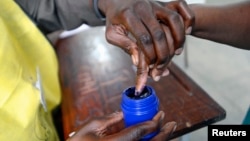When Mozambique held peaceful elections in October, observers and analysts hailed the vote and the peaceful transition of power from one leader to another as a turning point in the Southern African nation, which is perhaps best known for a bloody 15-year civil war that ended in 1992.
But since that vote, things have been complicated as politicians have squabbled publicly and tension has risen between the ruling Frelimo and opposition Renamo parties, and also within Frelimo. The party has dominated Mozambican politics since independence from Portugal in 1975.
A recent political development that effectively ended Frelimo’s main power struggle is being hailed by analysts and politicians as being as significant as the vote itself.
Frelimo party
Last weekend, Mozambique’s former president, Armando Guebuza, who didn’t run in October’s election due to term limits, quit as Frelimo party leader.
His resignation brought to a sudden end a months-long power struggle between Guebuza and the new president, Frelimo’s Filipe Nyusi. Guebuza’s resignation cleared the way for the only candidate for party chairman, Nyusi.
In taking the helm of the country and the party, Nyusi is following an established path in modern Mozambique. All of the nation’s post-independence presidents have simultaneously been Frelimo leader.
Alex Vines, the head of the Africa program at the London-based Chatham House research group, says this political realignment is a critical moment for Mozambique.
“I'm just surprised international media haven’t covered this in the way they should,” he told VOA News. “This is highly significant for Mozambique.” Had Guebuza not stepped aside, which Vines said was at the urging of top Frelimo members, the party may have had to wait until his term as party leader expired in 2017.
Judging from Guebuza’s own words, that could have led to more political squabbles. Just days before his resignation, he gave a fiery speech to party members, accusing unnamed members of sowing divisions.
Nyusi's acknowledgment
Days later when he officially announced his resignation, his spokesman delivered a statement that showed he understood the gravity of his words and actions, “Comrade Armando Guebuza said he had undertaken a profound reflection and, in order to maintain the unity and cohesion of Frelimo, taking into account the moment we are living through, and after consulting some party comrades, he reached the conclusion that now was the appropriate moment to resign.”
Nyusi appeared to recognize the importance of his new post. In his acceptance speech as party head, he promised to work for peace, because, he said, “it is only with peace that we shall develop Mozambique.”
Mozambique is poised to become an African energy giant after the discovery of massive gas reserves there in recent years.
“It’s a good question: is this a good thing for business?” Vines said. “In the political context of Mozambique, I guess it is because of the power struggle we were seeing between Guebuza, who had his own views on how things were being done, and Nyusi, new president coming in who has a different view of how business and politics and negotiations needed to go forth.”
Vines said the internecine squabbling was hindering development and business progress. The end of the political impasse also bodes well for Nyusi’s tenure. Prior to being elected, the 56-year-old was relatively unknown, having previously served one prominent public role, as defense minister.
“I, like many other observers, didn’t think this struggle would be resolved last weekend,” Vines said. “I was surprised, and in a way, I’m heartened that this shows that there’s a bit more democracy and debate in Mozambique. And the the early image of the Nyusi administration is that is trying to be more inclusive and trying to to learn from some of the mistakes of the Guebuza administration. We’ll see if it lasts. But so far, so good.”
Nyusi’s brief term as president of Mozambique has been plagued with political bickering, although he comfortably won the presidency with about 57 percent of the vote.
Parliamentary boycott
In January, as parliament sat for the first time and Nyusi prepared to be sworn in, opposition leader Afonso Dhlakama of the Renamo party threw a major wrench into the works by threatening to secede and declare himself president of the “Republic of Central and Northern Mozambique.”
He also led a boycott of that parliamentary session, keeping away Renamo’s 89 representatives in the 250-seat parliament.
Then in early March, a top opposition-allied lawyer, Gilles Cistac, was killed in broad daylight in central Maputo. Cistac had publicly supported a Renamo movement for greater autonomy in the nation’s north and center, leading observers to claim his killing was politically motivated. Frelimo condemned the killing. The killers remain at large weeks later.
Now Nyusi has all of his proverbial ducks in a row - and a mandate from his party and his people to move Mozambique forward.












